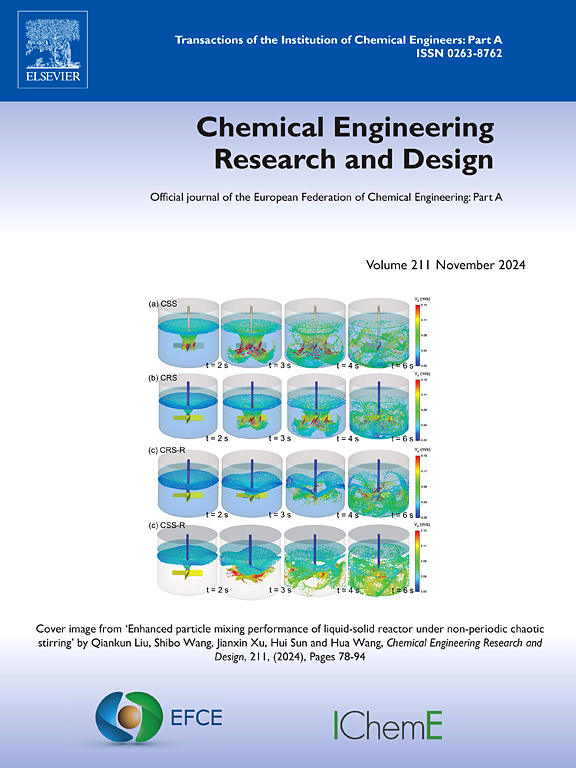Design and optimization of reaction-separation-recycle systems using a pseudo-transient continuation model
IF 3.7
3区 工程技术
Q2 ENGINEERING, CHEMICAL
引用次数: 0
Abstract
The reaction-separation-recycle (RSR) systems are an important part of chemical processes. Due to the interaction between reaction and separation sections, the behavior of RSR processes becomes highly complex and non-linear, posing different challenges for their design and optimization. The purpose of this study is to design and optimize RSR processes for irreversible liquid phase reaction systems using the pseudo-transient continuation (PTC) approach within an equation-oriented programing environment. This approach was applied to investigate one binary system and four ternary systems. The differential-algebraic models of the proposed process flowsheets were solved until the steady-state conditions were reached. The tray bypass efficiency method was incorporated into the PTC to circumvent the need for discrete optimization. The results demonstrated that in those cases where the product was heavier than the reactants, employing a stripping column was more economical than using a conventional distillation column for both the binary and ternary systems. In the ternary systems with two recycle streams, when the product was the intermediate component in terms of boiling point, the utilization of a divided-wall distillation column (DWC) resulted in a total annual cost saving of 35 % and 41 % compared to direct and indirect separation methods, respectively.
利用伪瞬态延续模型设计和优化反应分离-循环系统
反应-分离-循环(RSR)系统是化学过程的重要组成部分。由于反应段和分离段之间的相互作用,RSR 过程的行为变得非常复杂和非线性,给其设计和优化带来了不同的挑战。本研究的目的是在以方程为导向的编程环境中,使用伪瞬态延续(PTC)方法设计和优化不可逆液相反应系统的 RSR 过程。该方法用于研究一个二元体系和四个三元体系。对拟议工艺流程表的微分代数模型进行求解,直至达到稳态条件。托盘旁路效率法被纳入 PTC,以避免离散优化的需要。结果表明,在二元和三元系统中,当产物比反应物重时,使用汽提塔比使用传统蒸馏塔更经济。在有两个循环流的三元系统中,当产物是沸点的中间成分时,与直接和间接分离方法相比,使用分壁蒸馏塔(DWC)每年可分别节省 35% 和 41% 的总成本。
本文章由计算机程序翻译,如有差异,请以英文原文为准。
求助全文
约1分钟内获得全文
求助全文
来源期刊

Chemical Engineering Research & Design
工程技术-工程:化工
CiteScore
6.10
自引率
7.70%
发文量
623
审稿时长
42 days
期刊介绍:
ChERD aims to be the principal international journal for publication of high quality, original papers in chemical engineering.
Papers showing how research results can be used in chemical engineering design, and accounts of experimental or theoretical research work bringing new perspectives to established principles, highlighting unsolved problems or indicating directions for future research, are particularly welcome. Contributions that deal with new developments in plant or processes and that can be given quantitative expression are encouraged. The journal is especially interested in papers that extend the boundaries of traditional chemical engineering.
 求助内容:
求助内容: 应助结果提醒方式:
应助结果提醒方式:


